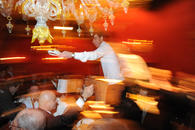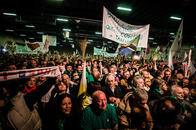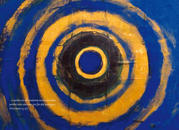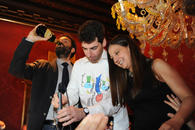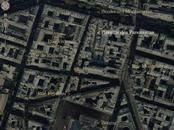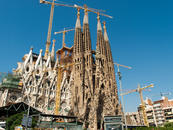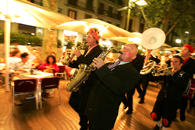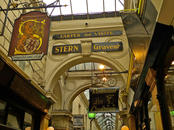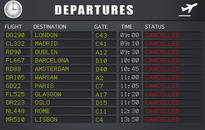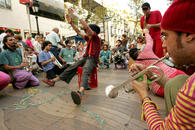At this point during the spring, a number of projects have seen the light, including the introductory work related to the opening of Stern Paris, the new worldwide advertising campaign Alé, and a small book celebrating the fortieth birthday of a great artist: Max Alajmo.
Sayings
Women can’t drive; all politicians are thieves; the law is not equal for everyone; you'll see when you have children; you can find anything on the Internet; when one door closes, another opens; money doesn’t buy happiness; it was better when it was worse; the grass is always greener on the other side; if she doesn’t love you, she doesn’t deserve you; you better finish your food, just think of all the starving children out there.
One could go on forever. Common sayings make you smile, if you line them up one after another. In general, then they are the most fun in the mouths of others, because if you were to say them they would become unquestionable truths, with the usual magnanimity of he who judge himself. But we all try to get by with one cliché or another, perhaps varying some nuance, giving them a little color. A derivative of the common saying is the proverb, also known as “conventional wisdom”, which is nothing more than an oxymoron because wisdom, among the virtues, is perhaps the most unpopular of all because it comes from calm and direct observation and critical analysis of events and people. It’s the elitist virtue par excellence.
Us “ad-men” depend on common sayings. Whether we like it or not, slogans, or the so-called headline, must pass through a thicket of clichés. I believe the perfect slogan is almost always the one that uses, paraphrases or draws upon a cliché or a proverb. Most famous the cliché or the saying, the stronger the message. It’s essential to pair it with other written and visual messages to give the slogan a connotation in a manner not entirely conventional - and enter the advertising professional. You can use the cliché negatively (to deny it, presenting something new) or positively (to confirm something “like never before”). So in the advertising race, we are wallowing in clichés: we cultivate, celebrate them, only to love them dangerously. At the end of the day, they resolve most of creative problems. Why look for an expensive solution?
In the past I have lived in close contact with a true master of common sayings. He based the rhythm of his days on them; he loved to use them regularly with people close to him, almost always in the form of proverb, declaimed in a stentorian voice with the air of finality. I was able to grasp the whole show over the years, including the thrill of seeing “capture” every moment, every fact, public and private, every misfortune, and every joy. This formula always revealed, in his eyes, the deeper meaning of things. I would almost define it a philosophical method: by interlocking of all those proverbs (or clichés) he derived a system that was weird, but with a certain causality morality, logic, even a semblance of teleology.
For a while I was dreaming about good-naturedly putting an end to that system, that tetragonal cathedral (in my eyes made out of scrap material of thought), with dialectics. But it was impossible to scale the cathedral and I ended up considering that absence of critical thinking as a useful counterbalance to stress that contrary that I was trying to communicate in those years, not to be ensnared in the typical way of advertising by profession, made with simplified, banal, and utilitarian exclusively language (and therefore thought, seeing as one is linked to the other). In short, it wasn’t so different from the “master of clichés,” and only slightly more aware.
Speaking of common sayings. Of all my eccentricities, the one that always arouses most consternation is my aversion to travel. When this comes up, which happens often given that travel and vacation being the highest expressions of globalized religion and therefore the argument for social excellence, I used to respond by saying “no, I don’t like to travel and no, I haven’t been to and will never visit that ‘must-be-seen’ place.” I couldn’t help but notice that people reacted with compassion, which in some turned in disgust, similar to that of healthy in front of the leper. And the beautiful souls, those less prone to disgust, tried to sugar-coat the issue: articulating well, as if writing to a retarded child, trying to explain to me the absolute value of the traveling: traveling, in addition to being fun for all, creates knowledge, it makes us better, opens minds (hence my delay, of course).
Even in this case for a while I tried to counter the sweet and enlightened view of the world, opposing mine. I would start by briefly listing the trivial practical inconvenience that come along with travel, the endless lines, dirt, widespread insecurity, bad food, down time... ; then I moved onto arguments like globalization, by virtue of rabid and endless consumerism, which means that only the outskirts of the world, places in which you will die of starvation today can really be said to be “uncommon places,” and of course the unfortunate theaters of war. Finally, and this was the decisive argument, I tried to show how this new religion, making perpetual mobility possible at the theoretical level (in preparation for the trip) and practical level (during the trip) allows you to constantly occupy the mind in an indefinite and temporary “elsewhere,” thus avoiding to stop and think about what it really happening, what are our positive and negative values, such as our role in society, what are the prospects, such as the basic problems to be solved. In this way I tried to describe the travelling as the perfect form of uncontrollable and brutal escape from oneself. It’s all too easy to imagine the disastrous results of my position. So in order to avoid creating enemies, for a while I gave up debating the issue. By doing so, I was able to witness, with the necessary detachment, the spread of this particular subspecies of the sect made up of billions of convinced, strong-willed followers - and too often fanatics.
And in the end I accept the inevitable praise for a city that is actually not that great: Barcelona (a real “super-cliché” of this moment in history, symbolized perfectly by the lump of arrogance and bad taste known as the Sagrada Familia), limiting myself to smile while imagining the rivers of contagious laughter flowing from travellers wandering through the famous Las Ramblas.
28/05/2014 Filippo Maglione


